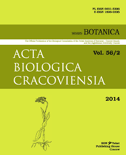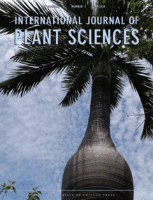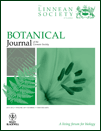
ACTA BIOLOGICA CRACOVIENSIA SERIES BOTANICA
Scope & Guideline
Connecting researchers to the heart of plant science.
Introduction
Aims and Scopes
- Plant Morphology and Anatomy:
Research exploring the structural features of plants, including studies on leaf and flower morphology, as well as anatomical adaptations to environmental stresses. - Plant Physiology and Biochemistry:
Investigations into physiological processes within plants, such as photosynthesis, stress responses, and the role of phytohormones like melatonin. - Taxonomy and Systematics:
Studies aimed at classifying and understanding the evolutionary relationships among plant species, with a focus on pollen morphology and chromosome analysis. - Environmental Botany:
Research assessing plant responses to environmental factors, including stress from salinity, heavy metals, and light conditions, as well as implications for ecosystem health. - Genetic Studies and Biotechnology:
Explorations of genetic diversity, gene transfer, and biotechnological applications in plant breeding and conservation efforts.
Trending and Emerging
- Plant Stress Response Mechanisms:
Increased focus on how plants cope with abiotic stressors, such as heavy metals and salinity, indicates a growing interest in understanding plant resilience and adaptation. - Molecular and Genetic Approaches:
Research utilizing molecular techniques, including gene knockout studies and genetic analysis, is on the rise, emphasizing the integration of biotechnology in plant research. - Ecological and Environmental Interactions:
There is a notable trend towards studies examining the interactions between plants and their environment, particularly in relation to climate change and habitat restoration. - Conservation and Endemism:
An increasing number of studies are dedicated to the conservation of endemic and rare plant species, highlighting the journal's commitment to biodiversity and ecological preservation.
Declining or Waning
- Traditional Taxonomic Studies:
While taxonomy remains important, there has been a decrease in papers solely focused on traditional taxonomic classifications without integrating molecular techniques or ecological contexts. - Invasive Species Research:
Research on invasive plant species has been less prominent, possibly due to a shift towards more urgent ecological issues like climate change and habitat loss. - Historical Botany:
The focus on historical or paleobotanical studies appears to be waning, as current research trends lean towards contemporary environmental issues and applied research.
Similar Journals

Nature Plants
Elevating Understanding of Plants and Their ImpactNature Plants is a premier journal dedicated to the dynamic and interdisciplinary field of plant science, published by NATURE PORTFOLIO in the United Kingdom. With an impressive impact factor placing it in the top tier of scholarly journals—ranking Q1 in Plant Science for 2023—this journal sets a high standard for research dissemination. Nature Plants has maintained a remarkable Scopus Rank of 5 out of 516 in the Agricultural and Biological Sciences category, reflecting its pivotal role in advancing knowledge in the field. The journal aims to provide a platform for groundbreaking research that addresses key challenges in plant biology, ecology, and agriculture, thereby fostering a deeper understanding of plant science's contribution to global sustainability. Although primarily non-open access, it offers exclusive insights and robust discussions, making it an indispensable resource for researchers, professionals, and students eager to explore the latest advancements and innovations in plant science.

INTERNATIONAL JOURNAL OF PLANT SCIENCES
Exploring the frontiers of plant science and ecology.The INTERNATIONAL JOURNAL OF PLANT SCIENCES, published by UNIV CHICAGO PRESS, is a leading journal dedicated to advancing knowledge in the fields of plant sciences and ecology. With an ISSN of 1058-5893 and an E-ISSN of 1537-5315, this journal has been a prominent platform for groundbreaking research since its establishment, featuring works from 1983 to present. It holds an impressive Q2 ranking in both Ecology, Evolution, Behavior and Systematics and Plant Science, reflecting its reputable standing within the academic community. The journal is well-regarded for its rigorous peer-review process and commitment to high-quality publication standards, making it a favored choice for researchers, students, and professionals eager to engage with the latest findings and innovative methodologies in plant research. While it does not currently operate under an Open Access model, the journal provides ample access options for institutions and individuals keen to explore its curated content. By presenting diverse studies that blend theoretical and practical insights, the INTERNATIONAL JOURNAL OF PLANT SCIENCES plays a critical role in fostering interdisciplinary dialogue and advancing the frontiers of plant science research.

Egyptian Journal of Botany
Pioneering insights in plant biology and crop science.Egyptian Journal of Botany is a premier publication in the field of botanical sciences, encompassing agricultural research, plant biology, and ecology. Published by the NATL INFORMATION DOCUMENTATION CENT, ACAD SCIENTIFIC RESEARCH & TECHNOLOGY in Egypt, this journal has made significant strides since its establishment, now recognized within several prestigious Scopus quartiles including Q3 in Agronomy and Crop Science, and Q3 in Ecology, reflecting its impact and relevance in the scientific community. With an aim to disseminate high-quality research and foster innovation in plant sciences, the journal provides a platform for researchers, professionals, and students alike to share vital findings and advancements. Although it currently operates under traditional access, the wealth of knowledge it offers is pivotal for those engaged in ecological preservation, crop improvement, and biotechnological applications. With its comprehensive scope and evolving reputation, the Egyptian Journal of Botany is poised to remain an influential player in the botanical sciences from 2019 to 2024 and beyond.

Alpine Botany
Championing Open Access to Alpine Botanical Research.Alpine Botany is a premier scholarly journal published by SPRINGER BASEL AG, dedicated to the field of ecological and botanical research with a specific focus on alpine environments. With an ISSN of 1664-2201 and an E-ISSN of 1664-221X, this journal has established itself as a significant platform for disseminating high-quality research findings, with its latest category rankings placing it in the Q1 quartile for both Ecology, Evolution, Behavior and Systematics as well as Plant Science. Originating from Switzerland, Alpine Botany benefits from its geographical context, fostering a rich exchange of ideas and research advancements relevant to high-altitude flora. The journal operates under an Open Access model, promoting widespread accessibility of its content while accommodating an increasing demand for interdisciplinary studies within the ecological and botanical communities. With a commitment to excellence, Alpine Botany continues to serve as an invaluable resource for researchers, professionals, and students who are keen to explore and understand the complexities of alpine ecosystems.

BOTANICAL JOURNAL OF THE LINNEAN SOCIETY
Advancing Knowledge in Botany and Environmental StudiesThe Botanical Journal of the Linnean Society, published by Oxford University Press, stands as a premier platform for interdisciplinary research within the realms of Ecology, Evolution, Behavior, and Plant Science. With a notable impact factor reflective of its esteemed reputation, this journal is classified in the Q1 quartile for both Ecology and Plant Science, placing it among the most influential publications in these fields. Since its inception in 1969, and with an anticipated convergence of research extending to 2024, it has become essential for scholars and professionals seeking to engage with cutting-edge studies, theoretical frameworks, and practical applications that drive our understanding of plant biology and ecological systems. The journal’s commitment to excellence is underscored by its robust Scopus rankings—achieving an impressive 83rd percentile in Ecology and a 82nd percentile in Plant Science. This makes the Botanical Journal of the Linnean Society a crucial resource for researchers, educators, and students alike, eager to advance their knowledge and contribute to the evolving discourse in botany and environmental studies.

Applications in Plant Sciences
Elevating Plant Research to New HeightsApplications in Plant Sciences is a prestigious journal published by WILEY, dedicated to advancing the field of plant science and ecology through original research and comprehensive reviews. With an impressive impact factor that places it in the Q1 category in both Ecology, Evolution, Behavior and Systematics, and Plant Science, the journal stands as a pivotal resource for scholars and practitioners. Since its establishment in 2013, it has embraced an Open Access model, ensuring that vital research is accessible to a global audience. The journal’s rigorous peer-review process and its commitment to high-quality content make it a leading platform for disseminating relevant findings, innovative methodologies, and cutting-edge technologies. Recognized in the Scopus rankings among the top percentile of journals, Applications in Plant Sciences continues to foster collaboration and inspire further studies that address the challenges and opportunities in plant biology. Researchers, students, and professionals alike will find this journal indispensable in keeping abreast of advancements and engaging with the forefront of plant science research.

TURKISH JOURNAL OF BOTANY
Cultivating a rich landscape of botanical insights.Welcome to the TURKISH JOURNAL OF BOTANY, a prestigious publication dedicated to advancing the field of plant science. Established in 1990 and published by the Tubitak Scientific & Technological Research Council Turkey, this journal serves as a vital platform for researchers, professionals, and students to disseminate their findings and insights on various botanical topics. With an impressive H-index that underscores its academic influence and recognition in the field, the journal is positioned in the Q2 quartile of plant science according to the latest category rankings. The ISSN of the journal is 1300-008X and the E-ISSN is 1303-6106, ensuring broad accessibility in both print and digital formats. As of 2023, it ranks #213 out of 516 in Scopus for Agricultural and Biological Sciences, placing it in the 58th percentile, which highlights its competitive standing among botanical journals. Researchers are encouraged to engage with its open-access options where available, fostering a collaborative and accessible research environment. With its commitment to quality and scientific rigor, the Turkish Journal of Botany remains an essential resource for anyone engaged in the exploration of plant sciences.

Brazilian Journal of Botany
Advancing plant science through innovative research.The Brazilian Journal of Botany, published by SOC BOTANICA SAO PAULO, stands as a vital resource in the field of plant sciences, particularly noted for its contributions to agricultural and biological research. With an ISSN of 0100-8404 and an E-ISSN of 1806-9959, this journal has established a robust presence since its inception, continuing to foster growth in botanical research through its anticipated publications from 2006 to 2024. Ranking in the second quartile (Q2) in Plant Science and positioned at 207 out of 516 within Scopus rankings, the journal demonstrates both quality and relevance, occupying the 59th percentile in its category. As an essential platform for scholars, practitioners, and students alike, it disseminates original research, reviews, and advancements within plant biology, thereby promoting understanding and innovation in plant sciences. While the journal currently does not offer open access, its rich content remains pivotal for those invested in the intricacies of botanical science.

PAKISTAN JOURNAL OF BOTANY
Unlocking Nature's Secrets: The Science of BotanyPakistan Journal of Botany, published by the Pakistan Botanical Society, is a leading platform for the dissemination of high-quality research in the field of plant sciences. Established in 1978 and with its most recent issues available until 2024, this journal has been pivotal in enhancing our understanding of botany, particularly in the South Asian context. With an ISSN of 0556-3321 and E-ISSN of 2070-3368, it serves a global readership, appealing to researchers, practitioners, and students alike. The journal is ranked in Q3 of the Plant Science category for 2023, indicating its scholarly significance, and it holds a position in the 51st percentile of its Scopus ranking. While currently offering limited open access, the journal continues to strive for broader accessibility to foster knowledge dissemination. Research published in the Pakistan Journal of Botany covers diverse topics, including but not limited to plant physiology, ecology, and conservation, making it an invaluable resource for anyone engaged in plant science research.

Botanical Studies
Unlocking the Secrets of the Plant KingdomBotanical Studies is a premier open-access journal published by Springer, dedicated to the field of botany and plant sciences. Since its establishment in 2006, the journal has championed innovative research and scholarship that explores diverse botanical topics ranging from plant systematics to ecology and conservation. With a commitment to broad accessibility, it promotes the dissemination of knowledge to researchers, professionals, and students worldwide. Botanical Studies fosters academic collaboration and dialogue, contributing significantly to the global botanical community. Its open-access policy allows unrestricted access to its high-quality, peer-reviewed content, ensuring that vital research is available to all. Join the growing community of scholars advancing botanical science through this essential publication, conveniently located at One New York Plaza, Suite 4600, New York, NY 10004, United States.